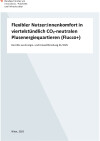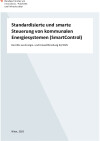Suchergebnisse
sustAIn4Build – KI-Kompetenz für nachhaltiges Gebäudemanagement in klimaneutralen Städten
Das Projekt sustAIn4Build zielt darauf ab, die Energieeffizienz und Nachhaltigkeit im Gebäudetechniksektor durch den gezielten Einsatz von Künstlicher Intelligenz (KI) zu steigern. Durch branchenspezifische Weiterbildungsmaßnahmen werden österreichische Unternehmen befähigt, KI-Technologien effektiv in ihre Prozesse zu integrieren, um ressourcenschonende, kosteneffiziente und nachhaltige Lösungen zu entwickeln. Dies stärkt deren Wettbewerbsfähigkeit und trägt zur Erreichung der europäischen Dekarbonisierungsziele bei.
sustAIn4Build - AI competence for sustainable building management in climate neutral cities
The objective of the project sustAIn4Build is to increase energy efficiency and sustainability in the building sector by using artificial intelligence (AI). Industry-specific training programs support Austrian companies to develop a workflow for integrating AI technologies into their processes, enabling them to develop resource-saving, cost-effective and sustainable solutions. This strengthens their competitiveness and contributes to the achievement of European decarbonisation goals.
Fit4Klim - Fit through education for the climate
The aim of the project is to develop and test customised training courses to qualify cities and municipalities in the areas of climate change adaptation and climate protection, spatial planning, green finance, energy and mobility.
Flucco+ - Flexibler NutzerInnenkomfort in viertelstündlich CO2-neutralen Plusenergiequartieren
Ziel des Projekts ist die Verbesserung der Planungsgrundlagen für die Errichtung und den Betrieb energieflexibler Bestands- und Neubauten in drei konkreten Bereichen. Erstens der Weiterentwicklung bestehender Modelle thermischen Komforts für dynamische Situationen, zweitens der Quantifizierung zukünftiger Netzdienlichkeit und drittens der holistischen Erprobung des entwickelten Komfort- und CO2-Modells an drei potentiellen Plusenergiequartieren unter Berücksichtigung der Ökobilanz sowie der Lebenszykluskosten.
Flucco+ - Flexible user comfort in quarter-hourly CO2-neutral Positive Energy Districts (PED)
The aim of the project is to improve the planning basis for the construction and operation of energy flexible buildings in three specific areas. First the further development of existing models of thermal comfort for dynamic situations, second the quantification of future energy grid usefulness and third the holistic testing of the developed comfort and CO2 model at three potential positive energy districts (PED), taking into account the ecological assessment as well as the life cycle costs.
Flucco+ - Flexibler NutzerInnenkomfort in viertelstündlich CO2-neutralen Plusenergiequartieren

Ziel des Projekts ist die Verbesserung der Planungsgrundlagen für die Errichtung und den Betrieb energieflexibler Bestands- und Neubauten in drei konkreten Bereichen. Erstens der Weiterentwicklung bestehender Modelle thermischen Komforts für dynamische Situationen, zweitens der Quantifizierung zukünftiger Netzdienlichkeit und drittens der holistischen Erprobung des entwickelten Komfort- und CO2-Modells an drei potentiellen Plusenergiequartieren unter Berücksichtigung der Ökobilanz sowie der Lebenszykluskosten.
Schriftenreihe
81/2025
T. Zelger, S. Schneider, B. Lipp, D. Bell, M. Schindler, M. Tabakovic, E. Kerschbaum, U. Muñoz-Czerny, V. Huemer-Kals
Herausgeber: BMIMI
Deutsch, 308 Seiten
Downloads zur Publikation
SmartControl - Standardisierte und smarte Steuerung von kommunalen Energiesystemen
Das Ziel ist die Entwicklung eines standardisierten und einfach implementierbaren Verfahrens für die Kommunikation, Überwachung und Steuerung von dezentralen Technologien innerhalb von kommunalen Energiegemeinschaften. Dazu werden innovative Schnittstellen und selbstlernende Algorithmen entwickelt, welche sicherstellen, dass das Konzept auf Kommunen bzw. Quartiere - ohne großen Daten- und Messaufwand - übertragen werden kann.
SmartControl - Standardized and smart control of municipal energy systems
The aim of the project is to develop a standardized and easy-to-implement procedure for communication, monitoring and control of decentralized technologies within municipal energy communities. Therefore, innovative interfaces and self-learning algorithms will be developed, which will ensure that the concept can be transferred to municipalities or neighborhoods without a great deal of data and measurement effort.
Standardisierte und smarte Steuerung von kommunalen Energiesystemen (SmartControl)

Das Ziel ist die Entwicklung eines standardisierten und einfach implementierbaren Verfahrens für die Kommunikation, Überwachung und Steuerung von dezentralen Technologien innerhalb von kommunalen Energiegemeinschaften. Dazu werden innovative Schnittstellen und selbstlernende Algorithmen entwickelt, welche sicherstellen, dass das Konzept auf Kommunen bzw. Quartiere - ohne großen Daten- und Messaufwand - übertragen werden kann.
Schriftenreihe
82/2025
Stefan Aigenbauer, Pascal Liedtke, Christine Mair, Bernhard Wüster
Herausgeber: BMIMI
Deutsch, 47 Seiten
Downloads zur Publikation
Wiener Neustadt Climate neutral
Wiener Neustadt as a pioneering city, is making a conscious and ambitious transition towards climate neutrality. This complex transformation requires different measures. The measures shall both be developed in-house or developed by others and transferred to Wiener Neustadt. The effect of the entire bundle of measures from the different areas (e.g. governance, implementation districts, learning environment or energy, mobility, buildings, etc.) is subject to fact-based climate monitoring.
Forschung und Innovation für Bauträger (Workshop)
8. Oktober 2025, 10:00 – 11:30 Uhr
Online
Der Workshop ging der Frage nach, wie das Thema der Innovation (im Spannungsfeld von Kosten, Nachhaltigkeit, Soziales) in der Quartiersentwicklung vorangebracht werden kann. Anhand konkreter Projekte wurden Wege und Lösungen gezeigt, wie Bauträger das Thema der innovativen und nachhaltigen Quartiersentwicklung in Angriff nehmen können bzw. welche Faktoren dabei unterstützend wirken.
Wiener Neustadt Klimaneutral
Wiener Neustadt führt als Pionierstadt einen bewussten und ambitionierten Wandel hin zur Klimaneutralität durch. Diese vielschichtige Transformation bedingt unterschiedliche Maßnahmen. Die Maßnahmen sollen sowohl selbst entwickelt, als auch von anderen Städten nach Wiener Neustadt transferiert werden. Die Wirkung des gesamten Maßnahmenbündels aus den unterschiedlichen Bereichen (z.B.: Governance, Umsetzungsquartiere, Lernumgebung bzw. Energie, Mobilität, Gebäude etc.) wird faktenbasiert einem Klima-Monitoring unterzogen.
Klima-Pionierstadt Graz (KPS_Graz)
Als integraler Bestandteil des laufenden Klimaschutzplan-Prozesses Graz wird das Klimapionierstadt Graz-Projekt mit dem Bundesministerium für Klimaschutz, Umwelt, Energie, Mobilität, Innovation und Technologie (BMK) spürbar dazu beitragen, dass die geplanten lokalen Prozesse und Maßnahmen zur Erreichung der Klimaneutralität rascher in Umsetzung kommen. Dies wird vor allem durch die Finanzierung zusätzlicher Klimaschutz-Expert:innen in der Stadtverwaltung erreicht.
Climate Pioneer City Graz (KPS_Graz)
As an integral part of the ongoing Climate Change Mitigation Plan Graz process, the Climate Pioneer City Graz project with the Federal Ministry for Climate Action, Environment, Energy, Mobility, Innovation and Technology (BMK) will make a noticeable contribution to ensuring that the planned local processes and measures to achieve climate neutrality are implemented more quickly. This will be achieved primarily through the financing of additional climate protection experts in the city administration.
Klimaneutrales Wiener Neustadt 2040
Wiener Neustadt möchte eine eigene Vision und Umsetzungsstrategie für Klimaneutralität bis 2040 entwickeln und in vier Schritten erarbeiten.
Climate neutral Wiener Neustadt 2040
Wiener Neustadt wants to develop its own vision and implementation strategy for climate neutrality by 2040 and develop it in four steps.
Mission Innovation Austria Week 2025
7. bis 9. Oktober 2025
forumKLOSTER, Rathausplatz 5, 8200 Gleisdorf
Die Mission Innovation Austria Week ist DER Treffpunkt für alle, die an der regionalen Energiewende arbeiten. Im Mittelpunkt stehen integrierte regionale Energiesysteme, wie sie aktuell in sechs österreichischen Reallaboren unter realen Bedingungen entwickelt und erprobt werden.
Mission Klimaneutrale Stadt - Technologien und Innovationen für die klimaneutrale Stadt 2025
Gefördert werden Forschungs- und Demonstrationsprojekte zur Entwicklung klimaneutraler, resilienter und klimawandelangepasster Städte. Einreichfrist je nach Ausschreibungs-Schwerpunkt: 10.07.2025 bzw. 09.10.2025.
BIOCOOL - Bio-inspirierte Oberflächen zur Verdunstungskühlung von Gebäudehüllen
Das Projekt Biocool ist eine Sondierung zur Übertragung von morphologischen Prinzipien von Blättern von Laubbäumen, die für thermische Eigenschaften und Verdunstungseffizienz optimiert sind, in parametrisches Design architektonischer, formoptimierter Oberflächen aus Keramik zur Klimatisierung von Gebäudehüllen. Diese Studie bereitet den Weg für ein industrielles Forschungsprojekt.
BIOCOOL - Bio-inspired Surfaces for the Evaporation Cooling of Building Envelopes
The BIOCOOL project will explore the transfer of morphological principles from leaves of deciduous trees, with optimized thermal properties and efficiency of evaporation to the parametric design of form-optimized architectural ceramic surfaces for climate control of building envelopes. The study paves the way for an industrial research project.
